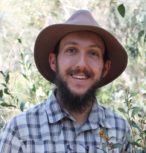DNA reveals the past and future of coral reefs
New DNA techniques are being used to understand how coral reacted to the end of the last ice age in order to better predict how they will cope with current changes to the climate. James Cook Univer

From 2005 to 2022, the main node of the ARC Centre of Excellence for Coral Reef Studies was headquartered at James Cook University in Townsville, Queensland (Australia)








Abstract:
There are a number of competing definitions of anomalous ‘novel’ communities, either via the ‘novel ecosystem hypothesis’ derived from restoration ecology, or as ‘no-analogue’ communities, as in palaeoecology. These definitions are at least partly incompatible, are often qualitative or based on system-specific assessments, and rely on the use of human-altered communities as baseline references. In this seminar, I will talk about the design of a universal quantitative framework to detect anomalous ‘novel’ communities in time-series data. The flexibility of this framework allows it to be applied across different systems, taxa, time-scales and even across different measures of community composition (e.g., phylogenetic and functional composition). Using this framework to detect novel communities in four marine micro-invertebrates over the last 66 million years, I’ll discuss the frequency of natural novel communities prior to human development, and whether these communities maintained themselves or immediately reversed into previous states. I’ll also briefly discuss my overarching research agenda, using palaeoecological datasets to provide spatially- and temporally-replicated assessments of community change in the absence of human impacts.
Biography:
Timothy Staples is a quantitative and community ecologist, and a post-doctoral research fellow at the ARC Centre of Excellence for Coral Reef Studies and the University of Queensland. His research focuses on studying community composition, change and function across time and space, and across environmental gradients. He is particularly interested in establishing baseline community dynamics prior to human development, especially in long-lived organisms such as reef corals. He is also keen to more fully integrate community ecological theory developed in terrestrial systems into marine research.
New DNA techniques are being used to understand how coral reacted to the end of the last ice age in order to better predict how they will cope with current changes to the climate. James Cook Univer
A new study on the effects of climate change in five tropical countries has found fisheries are in more trouble than agriculture, and poor people are in the most danger. Distinguished Profess
James Cook University researchers have found brightly coloured fish are becoming increasingly rare as coral declines, with the phenomenon likely to get worse in the future. Christopher Hemingson, a
Researchers working with stakeholders in the Great Barrier Reef region have come up with ideas on how groups responsible for looking after the reef can operate more effectively when the next bleaching
Abstract: As marine species adapt to climate change, their heat tolerance will likely be under strong selection. Individual variation in heat tolerance and its heritability underpin the potential fo
Abstract: The Reef Ecology Lab in KAUST’s Red Sea Research Center explores many aspects of movement ecology of marine organisms, ranging from adult migrations to intergenerational larval dispersal
Abstract: Macroalgal meadows are a prominent, yet often maligned component of the tropical seascape. Our work at Ningaloo reef in WA demonstrate that canopy forming macroalgae provide habitat for ad
Abstract: Sharks are generally perceived as strong and fearsome animals. With fossils dating back at least 420 million years, sharks are not only majestic top predators but they also outlived dinosa
Abstract: Connectivity plays a vital role in many ecosystems through its effects on fundamental ecological and evolutionary processes. Its consequences for populations and metapopulations have been
Abstract: Evolution of many eukaryotic organisms is affected by interactions with microbes. Microbial symbioses can ultimately reflect host’s diet, habitat range, and even body shape. However, how
Abstract: The past few years have seen unprecedented coral bleaching and mortality on the Great Barrier Reef (GBR) but the consequences of this on biodiversity are not yet known. This talk will expl